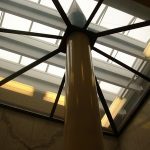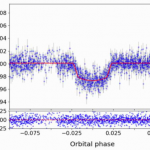The mystery of the impossible black hole
There is a long-standing myth that a scientist is a fusty, stubborn old man, refusing the believe the exciting new result because it would mean that he was wrong. But is that really true? In 2015, astronomers began to study the universe in a brand-new way. Instead of using light from the cosmos, the Advanced […]

Successful Verification of the First Lobster X-ray Mirror Assembly for SVOM
Julian Osborne highlights the recent success of the team in the Space Research Centre that is making the flight X-ray optic for the Chinese-French satellite SVOM. The SVOM satellite will extend the work done by the Swift mission in characterising the enormous energies of the gamma-ray bursts, crucially extending measurements down to lower energies where […]

Introducing SKYLARK
The SKYLARK rocket dominates our newly-revamped foyer in the School of Physics and Astronomy. This blog post provides some of the history of Leicester’s involvement in the SKYLARK project. The involvement of the School of Physics and Astronomy in major space missions began with work developing instruments for Sounding Rocket flights. Starting in 1961, the […]
Nobel Prize: How Penrose, Genzel and Ghez helped put black holes at the centre of modern astrophysics
The award of this year’s Nobel prize in physics to Roger Penrose, Reinhard Genzel and Andrea Ghez will be greeted with enormous pleasure by physicists and astronomers worldwide. Professor Andrew King blogs about the importance of their research (reprinted from the Conversation). The award of this Nobel prize recognises the central importance of black holes […]

Six Decades of Space Science
At the start of World Space Week, we’re marking 60 years of space science at the University of Leicester. Leicester has had a Physics Department since 1924, long before it gained University status. It was in 1957 – appropriately enough, the year that Sputnik 1 was launched – that Leicester University College was granted the […]
AstroSeminar: Expecting the unexpected in the search for extraterrestrial life
This week’s virtual Wednesday talk will be by Peter Vickers (Durham), a philosopher, who will present “Expecting the unexpected in the search for extraterrestrial life” Members of the School can access this seminar via Microsoft Teams. ABSTRACT: On p. 10 of the 2018 National Academies Exoplanet Science Strategy document (NASEM 2018), ‘Expect the unexpected’ is described […]

Emma Bunce Discusses Planetary Missions on RAS podcast
“I think I would probably go back in time and pick Voyager…“ Our Head of School, and President of the Royal Astronomical Society Prof. Emma Bunce is featured in Episode 9 of the #RASSupermassive podcast – it’s all about space probes! Join her for a chat about her favourite mission, probes visiting Jupiter and its […]

Introducing AstRoSoc: Our Astronomy and Rocketry Society
AstRoSoc is the University of Leicester’s Astronomy and Rocketry Society! If your Curiosity has led you to seek a deeper InSight into the Universe around you, we hold regular Observatory nights to allow you to become the Explorer of these New Horizons! If you’d like to learn how to shoot for the stars then we […]
Astrophysicist Shortlisted for 2020 Woman in STEM Award
Congratulations Dr. Sarah Casewell for being shortlisted in the Women’s Awards 2020. Congratulations to our STFC Ernest Rutherford Fellow Dr. Sarah Casewell for being one of the Shortlisted Candidates for the East Midlands Outstanding Woman in STEM 2020 Award. The Women’s Awards celebrate the dynamic contribution of women across the East and West Midlands. The purpose of these Awards is […]

NGTS discovers an extremely small star in an eclipsing binary
Leicester PhD student Jack Acton discusses his latest discovery, a record breaking eclipsing binary system found in data from the NGTS exoplanet survey. NGTS recently announced the discovery of an extremely small star, NGTS J0930-18B, in an unusual eclipsing binary system in work led by myself and the team at Leicester (Acton et al, 2020). […]

Recent Comments